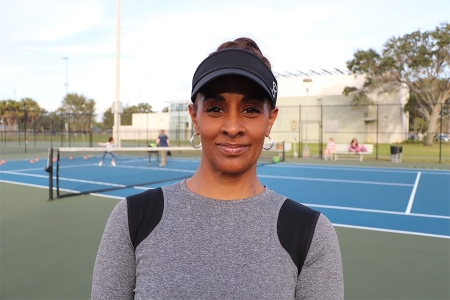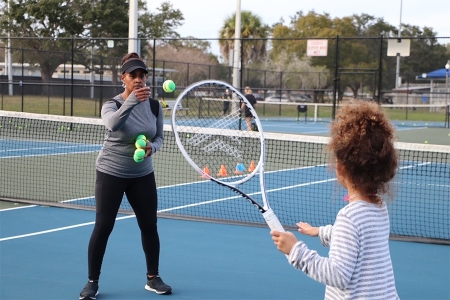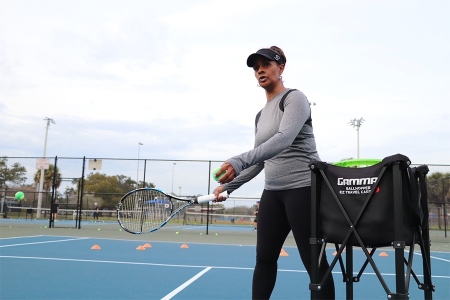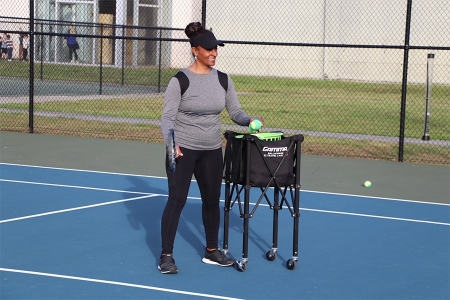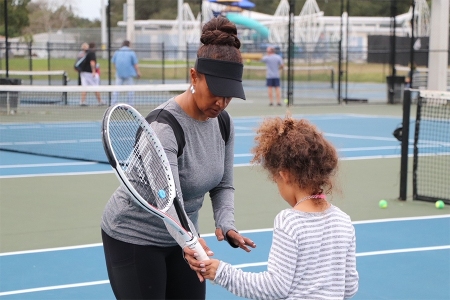In celebration of Black History Month, throughout February USTA Florida recognizes all of those in the Black community whose talents and dedication help to grow the great game of tennis every day — at every level. We applaud them all for making tennis a better and more inclusive sport, and for making the face of our game more accurately reflect the dynamic diversity of our country. As part of our coverage, USTA Florida has provided a platform for community members to be honest and open about their thoughts and experiences.
Maribel Gross is a New York City native who now resides in Largo and can be found on the courts around Pinellas county. The PTR certified teaching professional is a passionate 10 & under tennis coach at the JW Cate Recreation Center in St. Petersburg who also devotes a lot of her time promoting the game to young, underprivileged children.
Tennis is clearly a big part of your life. When did you first pick up a racquet?
I first tried hitting a tennis ball once when I was 22 and living in Los Angeles, Cali. I didn’t pick up a racquet again until moving to Florida with my family 17 years later. Now I’m a certified teaching pro at the JW Cate Recreation Center in St. Petersburg. I play on women’s day leagues at my local tennis club and I also captain various USTA women’s league teams as well as play on them. I also volunteer at various community centers throughout Pinellas County to promote the game of tennis with instruction for young, underprivileged children.
You’re a 10 & Under Tennis Coach – what is the most rewarding part of teaching young kids?
Being able to teach them before they’ve developed any bad habits and then seeing their enthusiasm and growth as they grasp the game.
What are some of the highlights that stand out in your tennis career?
Taking a team to sectionals and watching them get to the semi-finals but then having to suspend play while down a set because they were rained out. The team wasn’t able to reconvene until a month later and the ladies not only overcame the deficit but went on to become league champions.
Have you ever felt less valued in a tennis-related space because of your racial background?
I feel fortunate to have never knowingly been made to feel less valued on the tennis court because of my race.
Has your race ever impacted your career on and off the court?
Only in ways that I’ve felt were humorous. At one of the tennis clubs where I play leagues, they have one woman of color who is a member. Whenever I play at that club, various people will wave to me and say “hello” calling me by her name. Some people might get angry at that, but I can’t help but find it to be funny since I feel that we don’t resemble each other.
What do you believe can be done to foster long-term change when it comes to racial inequality in Florida tennis?
I believe everyone in life, regardless of their racial background, simply longs to be welcomed and accepted. If people of color knew that they would be welcomed at a local tennis club that had developed a special program to encourage people who would otherwise not be able to afford a membership to continue to develop their skills and game, that would make a significant difference to the visual landscape of the local tennis scene. This could be established through members who could join together to be sponsors, or through local businesses who would offer “tennis scholarships” to clubs.
More specifically, what do you think USTA Florida could do to strengthen its relationship with minority communities?
Whenever possible, the successful minority tennis pros should make appearances at schools, community centers, etc., to talk about their experiences and to put on exhibitions that would expose the game of tennis to the underprivileged, while also showing that the game is there for them.
Why is it important to celebrate Black History Month in general, as well as in tennis?
We should always acknowledge and remember those whose accomplishments made a difference and educate others whenever possible. Those are the stories that could inspire a young person to fight for change and make a difference in his or her community in the future. People like Arthur Ashe and the Williams sisters have made such a dramatic impact in a game that has so much room for more like them. It would be nothing but a win for communities everywhere, to expand the field of talent in this fantastic sport for those who would otherwise not have a chance to participate.
Why is it important to not only support and celebrate other cultures, but be inclusive to all?
Regrettably, too many messages being repeated these days are falsehoods about why we should fear each other. The sooner more of us can acknowledge that most people are just like we are, who want the same type of things and know that there is so much more to learn and experience amongst one another, the better things will get for everyone who chooses to become involved.
If you had to share your message of unity, what would it be?
In my opinion, “real life” is a glorious tapestry of many different and beautiful colors, ethnicities and cultures out there. The more we learn and experience through interacting together, the more complete we become as human beings.
USTA Florida believes tennis is for everyone. For more information about USTA Florida’s Amplify initiative, visit USTAFlorida.com/Amplify.

